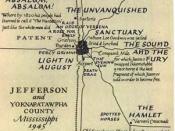An Analysis of
"A Rose for Emily"
William Faulkner's "A Rose for Emily" is a very complex story. This short story was Faulkner's "first sale of a short story to a national magazine: Forum" (Skei, 84). Faulkner, born in Mississippi, "began to construct his fictional chronicle of Yoknapatawpha County, (which is) often based directly on the history of his own Lafayette County" (Inge, 136). This is the setting of "A Rose for Emily." Also, Faulkner based the character of Colonel Satoris on his great-grandfather, "Colonel William Clark Falkner" (Inge, 136). Colonel William Clark Falkner had a literary reputation also. He wrote The White Rose of Memphis" (Inge, 136). However, Falkner's talent was not inherited. "He became friends with a young Oxford lawyer named Phil Stone, a graduate of Yale University and a man of somewhat cultivated literary taste, who would provide him with some of the first reading material that would shape his talent" (Inge, 136).
Faulkner started out writing poems, then novels, and then short stories. When Forum bought "A Rose for Emily," it gave Faulkner encouragement to keep writing short stories. "A Rose for Emily" may not be Faulkner's best short story, but the characteristics it holds make it a famous story. In "A Rose for Emily," Faulkner places importance in three different elements: characterization, symbolism, and theme. Each of these helps explain the story very vividly, almost to the point one might feel a part of it.
Characterization is a very important element in "A Rose for Emily." The protagonist of the story is Miss Emily. The antagonists of the story are Miss Emily's father, the community, the druggist, and the new Aldermen. There are also a few flat characters, which are Homer, old lady Wyatt, Colonel Satoris, Judge Stevens, and the minister...



Awesome Job!
This is a very well constructed and cited essay.
0 out of 0 people found this comment useful.